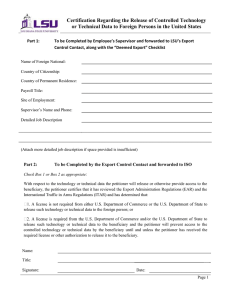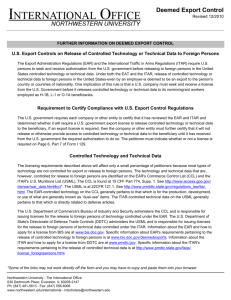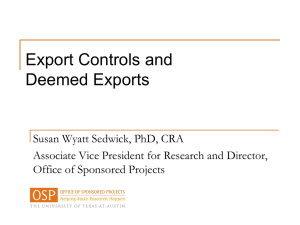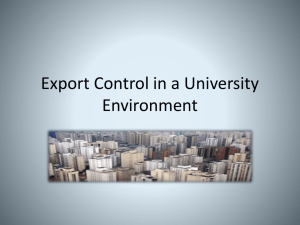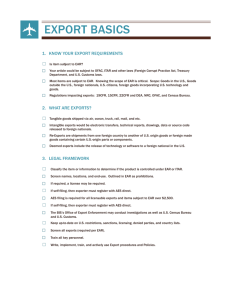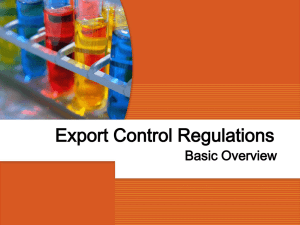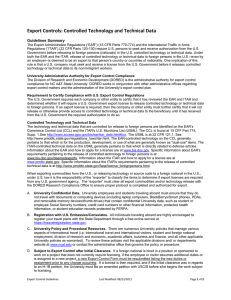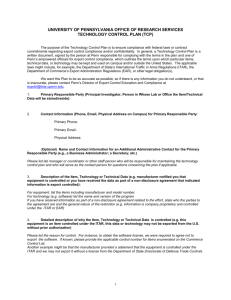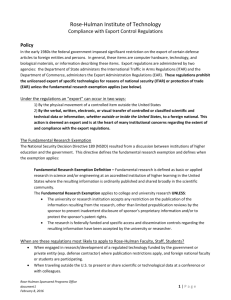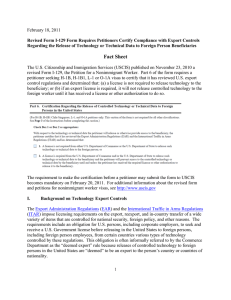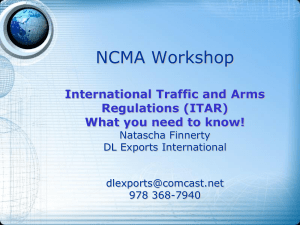Petitioner Questionnaire Supplement
advertisement
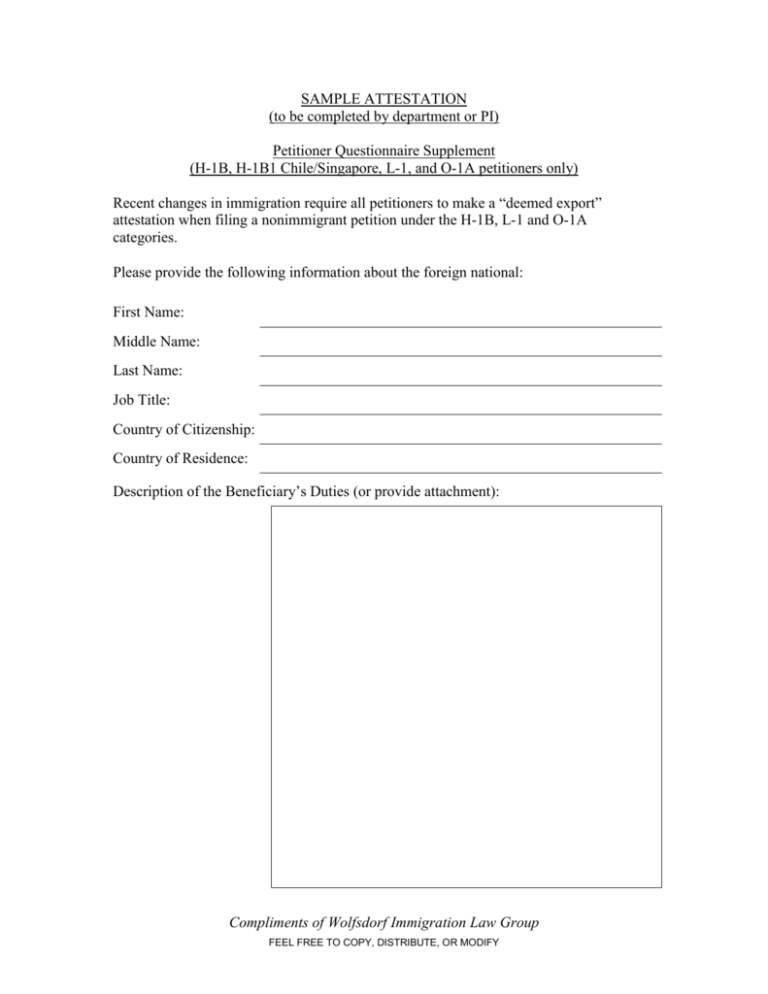
SAMPLE ATTESTATION (to be completed by department or PI) Petitioner Questionnaire Supplement (H-1B, H-1B1 Chile/Singapore, L-1, and O-1A petitioners only) Recent changes in immigration require all petitioners to make a “deemed export” attestation when filing a nonimmigrant petition under the H-1B, L-1 and O-1A categories. Please provide the following information about the foreign national: First Name: Middle Name: Last Name: Job Title: Country of Citizenship: Country of Residence: Description of the Beneficiary’s Duties (or provide attachment): Compliments of Wolfsdorf Immigration Law Group FEEL FREE TO COPY, DISTRIBUTE, OR MODIFY All Petitioners are required to answer the following question: With respect to the technology or technical data the petitioner will release or otherwise provide access to the beneficiary, the petitioner certifies that it has reviewed the Export Administration Regulations (EAR) and the International Traffic in Arms Regulations (ITAR) and has determined that: 1. A license is not required from either U.S. Department of Commerce of the U.S. Department of State to release such technology or technical data to the foreign person; or 2. A license is required from the U.S. Department of Commerce and/or the U.S. Department of State to release such technology or technical data to the beneficiary and the petitioner will prevent access to the controlled technology or technical data by the beneficiary until and unless the petitioner has received the required license or other authorization to release it to the beneficiary. Please consult with the appropriate office on campus that handles export compliance (e.g. Provost Office, Compliance Office, General Counsel Office, Institutional Research, Office of Sponsored Programs, Office of Research, Grant Accounting, etc.) to verify if such a license is required and to determine how to answer the above-mentioned attestation. I verify that I have consulted with at the Office and confirm that all of the above information is accurate. Signature: Title: Telephone Number: Email: Date: BACKGROUND To work with controlled “dual-use” technologies in the United States, foreign nationals and the companies that employ them must comply with both U.S. export control and visa regulations. Employers must possess any required export licenses and the foreign national should hold the appropriate nonimmigrant visa classification. When a company releases controlled technology to a foreign national during the course of employment, a “deemed export” occurs. The “deemed export” rule presumes that any technology released to a foreign national in the United States will be exported to the foreign national’s home country. The reasoning behind the rule is that the uncontrolled release of technology to a foreign national in the United States could ultimately result in the dissemination of Compliments of Wolfsdorf Immigration Law Group FEEL FREE TO COPY, DISTRIBUTE, OR MODIFY sensitive technologies and information to risky foreign governments, terrorist organizations or any other entities involved in activities contrary to our security and national interests. Once the technology is released, there is no way to “take it back.” It is critical to understand that although counterintuitive, export controls that relate to a physical export of the technology to a foreign country, would also apply to the release of the technology in the United States to a foreign national of that country, because it is considered an “export” under applicable regulations. U.S. Export Controls on Release of Controlled Technology or Technical Data to Foreign Persons. The Export Administration Regulations (EAR) (15 CFR Parts 770774) and the International Traffic in Arms Regulations (ITAR) (22 CFR Parts 120-130) require U.S. persons to seek and receive authorization from the U.S. Government before releasing to foreign persons in the United States controlled technology or technical data. Under both the EAR and the ITAR, release of controlled technology or technical data to foreign persons in the United States—even by an employer—is deemed to be an export to that person's country or countries of nationality. One implication of this rule is that a U.S. company must seek and receive a license from the U.S. Government before it releases controlled technology or technical data to its nonimmigrant workers employed as H-1B, L-1 or O-1A beneficiaries. Requirement to Certify Compliance with U.S. Export Control Regulations. The U.S. Government requires each company or other entity to certify that it has reviewed the EAR and ITAR and determined whether it will require a U.S. Government export license to release controlled technology or technical data to the beneficiary. If an export license is required, then the company or other entity must further certify that it will not release or otherwise provide access to controlled technology or technical data to the beneficiary until it has received from the U.S. Government the required authorization to do so. The petitioner must indicate whether or not a license is required on Page 6, Part 7 of Form I129. Controlled Technology and Technical Data. The licensing requirements described above will affect only a small percentage of petitioners because most types of technology are not controlled for export or release to foreign persons. The technology and technical data that are, however, controlled for release to foreign persons are identified on the EAR's Commerce Control List (CCL) and the ITAR's U.S. Munitions List (USML). The CCL is found at 15 CFF Part 774, Supp. 1. See http://www.access.gpo.gov/bis/ear/ear_data.html#ccl. The USML is at 22 CFR 121.1. See http://www.pmddtc.state.gov/regulations_laws/itar.html. The EAR-controlled technology on the CCL generally pertains to that which is for the production, development, or use of what are generally known as "dual-use" items. The ITARcontrolled technical data on the USML generally pertains to that which is directly related to defense articles. The U.S. Department of Commerce's Bureau of Industry and Security administers the CCL and is responsible for issuing licenses for the release to foreign persons of Compliments of Wolfsdorf Immigration Law Group FEEL FREE TO COPY, DISTRIBUTE, OR MODIFY technology controlled under the EAR. The U.S. Department of State's Directorate of Defense Trade Controls (DDTC) administers the USML and is responsible for issuing licenses for the release to foreign persons of technical data controlled under the ITAR. Information about the EAR and how to apply for a license from BIS are atwww.bis.doc.gov. Specific information about EAR's requirements pertaining to the release of controlled technology to foreign persons is at www.bis.doc.gov/deemedexports. Information about the ITAR and how to apply for a license from DDTC are at www.pmdtc.gov. Specific information about the ITAR's requirements pertaining to the release of controlled technical data is at http://www.pmddtc.state.gov/faqs/license_foreignpersons.html. Compliments of Wolfsdorf Immigration Law Group FEEL FREE TO COPY, DISTRIBUTE, OR MODIFY
